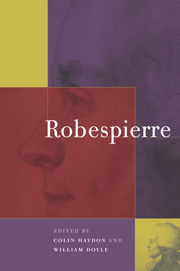16 - French historians and Robespierre
Published online by Cambridge University Press: 14 January 2010
Summary
It is very clear that Robespierre played a key role in the French Revolution, and also that, two centuries after his death, he remains a controversial figure, whom many have hated, many have worshipped, and who still exerts a kind of fascination. A survey of the various views which historians have held of Robespierre, and of the controversies about him, can thus throw some light upon the development of the Revolution's historiography and its correlation with the vicissitudes of French political and intellectual life, into which the very bias and special pleadings of many historians can provide useful insights. As John McManners has rightly remarked: Tarty strife and inherited prejudices have branded their mark upon most French historians of the Revolution.
This is why this essay will only consider French historians, from Adolphe Thiers onwards, though the major contributions which British and American scholars have made to our knowledge of the French Revolution are of immense importance. But here we shall consider the debate on Robespierre - especially in relation to the Terror - as a political Franco-French debate, an aspect of the nation's permanent civil war (to the violence of which the Terror's legacy has greatly contributed).
Three main stages can be observed in French historians’ perceptions of Robespierre, leaving aside the royalist ones.
In the nineteenth century, when liberalism was dominant, most historians were critical of Robespierre, though a minority, with socialist leanings, held more favourable views.
In the twentieth century, as socialism, and especially Marxism-Leninism, came to prevail, many historians became unconditional supporters of the Incorruptible, to the point of idolatry.
- Type
- Chapter
- Information
- Robespierre , pp. 255 - 283Publisher: Cambridge University PressPrint publication year: 1999
- 1
- Cited by



